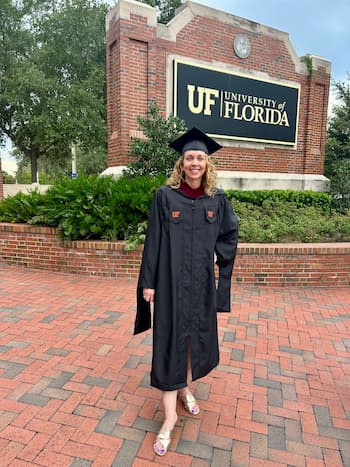Public Interest Communications: Amy Pavuk-Gentry’s Philosophy of Purpose

As a kid, Amy Pavuk-Gentry imagined herself in a newsroom, an intrepid reporter chasing down the latest stories. Every day, something new to find out, another story to tell.
For her, journalism encapsulated everything she loves: curiosity, discovery, creativity, and writing. It was an opportunity to seek justice and give voice to the voiceless.
What a child imagined became real. After earning her bachelor’s degree in 2002, Pavuk-Gentry spent more than a dozen years in journalism.
Evolution: The Next Chapter
In 2015, Pavuk-Gentry launched the next phase of her communications career, moving to Altamonte Springs, Fla.-based AdventHealth, where she now serves as executive director of corporate communications in the Central Florida Division. The job offers much of what attracted her to journalism.
“There’s always something new to learn,” she says. “ The role requires impactful writing, creativity, and analytical thinking as we support the organization, share the remarkable stories of our mission, and engage with the community.”
As a senior communications professional in a large complex organization, Pavuk-Gentry understands the responsibilities and demands of leadership. “The communications industry is evolving at such a rapid pace,” she says. “To be on the forefront of innovative practices, I felt I needed the boost of a graduate degree, which would provide the rigor and emerging best practices.”
She chose to enroll in the online Public Interest Communications program at the University of Florida School of Journalism and Communications.
As with many working professionals, the online program’s flexibility offered huge advantages to Pavuk-Gentry. The Public Interest Communications curriculum combined advocacy, marketing, journalism, and behavioral science communications, an area new to her.
“The introductory PIC courses that dive into behavior science, why traditional awareness campaigns fail, and the information deficit model were eye-opening,” Pavuk-Gentry notes. Graduate-level elective tracks enabled her to target specific topics and courses, allowing her to become a better practitioner and leader.
She cites one significant “aha” moment while studying the foundational principles of the six spheres of influence.
“It laid the stage for the entire PIC program and practice,” she says. “Even in organizations where there’s high collaboration between the communications, marketing, and advocacy departments, viewing the work through the lens of a fully integrated campaign that harnesses the power and best practices from each area, along with the other three spheres, was enlightening.”
Transforming Theory into Practice
As with journalism, healthcare communication addresses diverse communities, each tuned to its own technical, cultural, and generational messaging nuances. How messages are targeted, created, and conveyed can change lives.
Pavuk-Gentry cites a direct line from her graduate studies to her work at AdventHealth. She describes how her studies in the PIC program inspired a change in her approach to internal communications at AdventHealth.
The news releases her team produces are written by a team comprised largely of former reporters for current reporters. However, the language, tone, nuance, and delivery that work in a journalistic setting often didn’t resonate with large segments of AdventHealth’s 34,000-strong workforce.
“We know that ‘everyone’ is not an audience,” she says, “so that also means that ‘all employees’ are not an audience. In the past, we tended to parrot that language in other vehicles designed for other audiences, such as our internal comms vehicles for our predominantly Gen Z and Millennial workforce,” Pavuk-Gentry recalls. “When I started to evaluate our vehicles based on the target audience, I realized we weren’t speaking the same language, tapping into their values, behaviors, or their content-consumption preferences.”
She and her team redesigned their internal communications strategy, expanding on traditional demographics to consider “psychographics, interests, attitudes, and values in message creation, vehicle designs, and messenger selection,” she explains.
By putting theory into practice, Pavuk-Gentry and her team created messaging designed to reach its audience where they lived, in a style and tone they understood.
The results validated the academic principles she’d learned, creating measurable improvements in employee engagement.
“We’ve seen wins with this strategy,” Pavuk-Gentry says. “It’s been a great correlation between academia and my professional application.”
Healthcare, Communication, and a Philosophy of Purpose
Pavuk-Gentry’s philosophy of community service is reflected in her approach to healthcare communications. She recognizes that human health and well-being intersect with virtually every social issue.
“Housing is health care if you’re homeless,” she says. “Workforce development can enhance your health and access to healthcare. The climate impacts our physical health. Spiritual beliefs and faith can impact health.”
Her compassion, empathy, and professional expertise reflect her philosophy of purpose and understanding that communication is the lifeblood of any complex human endeavor. Pavuk-Gentry sees limitless opportunities for her team to impact health through announcing groundbreaking medical treatments, inspiring employees to become better caregivers, recruiting future workers, or helping executives communicate complex topics.
BBQ, Hiking, and Tucker
Amy Pavuk-Gentry graduated with her Master of Arts in Mass Communication-Public Interest Communication in August 2025.
Originally from Pittsburgh, she remains a devoted Steelers and Pirates fan. She (half) jokes that grad school has been her hobby for the past three and a half years. But hiking the Appalachian Trail, one section at a time, is seriously a hobby. To celebrate her graduation, she plans to hike a section in West Virginia with her husband, Chris Gentry, an award-winning pitmaster and catering business owner. The couple shares life with their “wild and adorable goldendoodle,” Tucker.
Her story resonates particularly for communications professionals considering graduate education later in their careers. Pavuk-Gentry proves that advanced degrees aren’t just for career pivots. They are tools for deepening impact and expanding influence in fields where staying current isn’t optional, it’s essential.
She also personifies the power of aligning personal values with professional growth, a move that can create ripple effects that extend far beyond any single campaign or strategy. In healthcare communications, every message can potentially improve lives.
Pavuk-Gentry’s journey illustrates the evolution of modern communications professionals who refuse to be constrained by traditional silos. By combining journalistic integrity with behavioral science, advocacy with analytics, and personal purpose with professional excellence, she demonstrates how continuous learning and adaptive thinking can transform both careers and communities.
“We all have unique talents and skills, and being able to turn mine into a career and apply them daily is a tremendous privilege and gift,” she reflects.
One of her guiding quotes comes from the late columnist Erma Bombeck: “When I stand before God at the end of my life, I would hope that I would not have a single bit of talent left, and could say, ‘I used everything you gave me.’”
Posted: August 20, 2025
Category: Student Spotlight, Student Success, UF CJC Online Profiles


